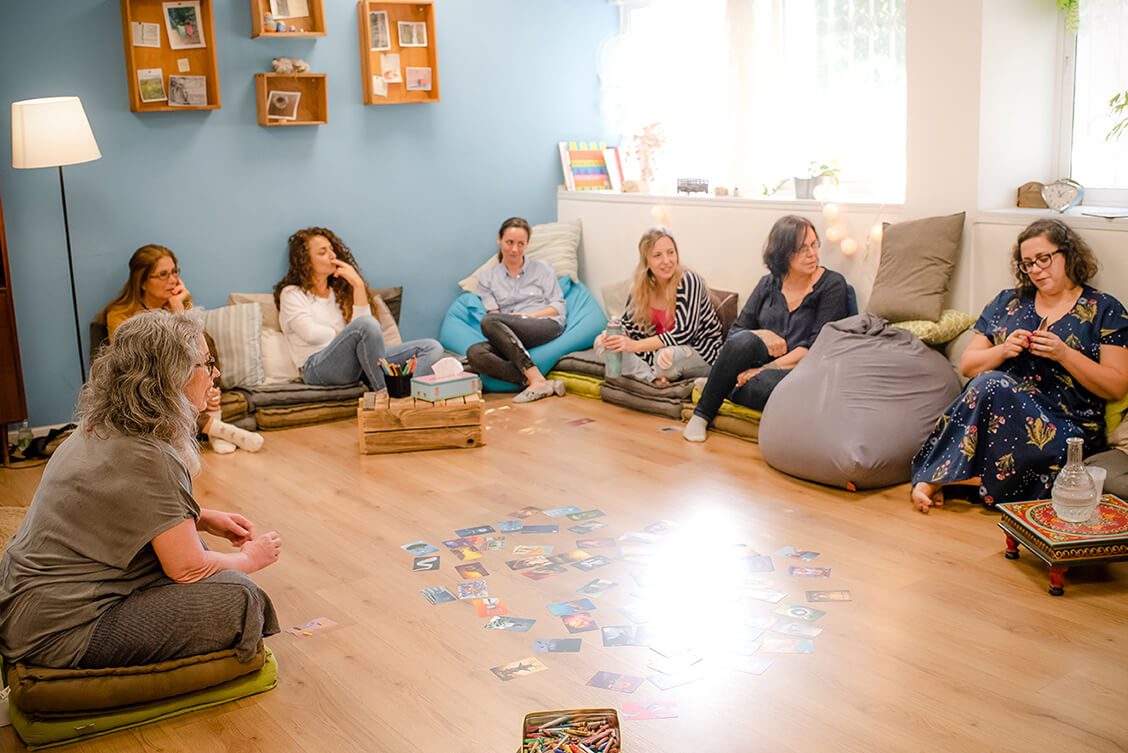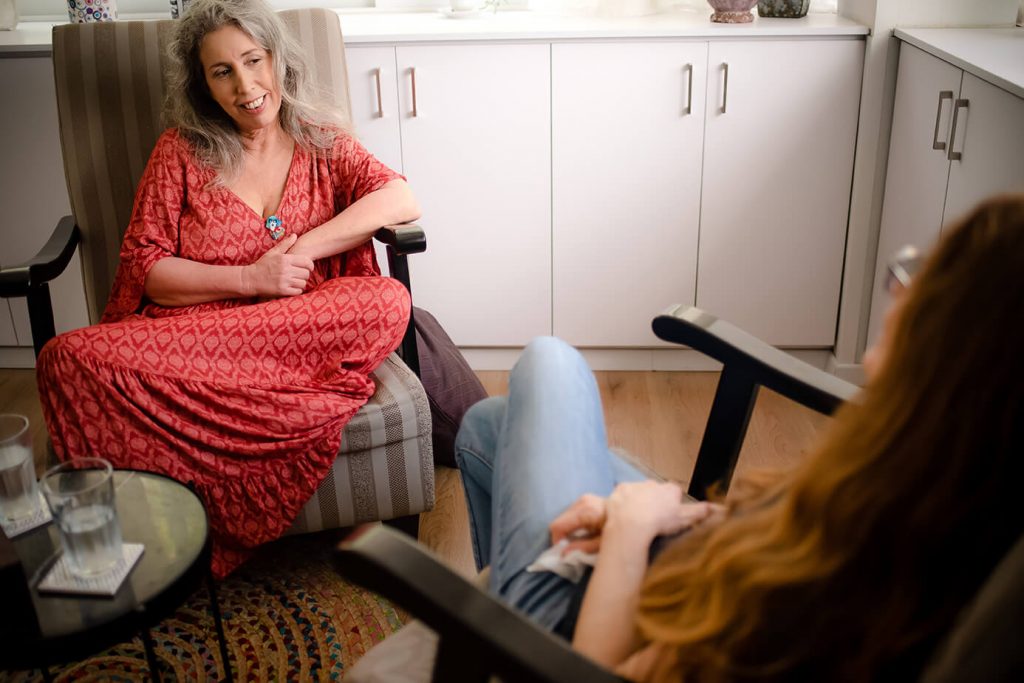Welcome,

Welcome,
I am Annat—woman, mother, daughter, friend. I am a Focusing coordinator for adults and children, and a Systemic and Family Constellations facilitator.
I love to listen, observe, feel, think, love, and write. I formed HomeFocusing, a holistic approach with which I accompany individuals, dyads, families, and groups on the wonderful journey inside and out. I continue to develop HomeFocusing and teach those who choose to bring this approach to the world and to deepen their practice.
Looking back at my life, I can see that from a very young age, these elements were fundamental for me:
Words through which I spoke and wrote, as a lawyer, journalist, writer, and editor, as a creative person.
Relationships – As an only child in a very small family, I felt the need to surround myself with people, especially through close friendships and intimate relationships, and by forming my own family.
And the body that signaled, shouted, hurt, and often raged with emotions but remained, at least to some extent, inaccessible.
All three were there, but how they all related was not clear: Bodily and mental pain remained stuck, as did relationships. The words were unable to bring understanding and they certainly brought no relief.
Over the years I have explored and tried many mind-and-body techniques, which have yielded wonderful results: Someone—a therapist—diagnosed and dispensed medicine or treatment. It helped for a while, but I didn't understand anything. I remained dependent on the therapist, and when she wasn’t there, I was left alone.
Then I entered the world of Focusing and felt how everything finally fell into place; how I now had access to what was within and outside of me. I felt that I had come home.
Focusing has changed and continues to change my life: It improves my physical health, facilitates emotional coping, clarifies, and leads to insights, increases patience and listening, enables accuracy and decision making, and improves and strengthens my relationships.
Focusing has changed and continues to change my life: It improves my physical health, facilitates emotional coping, clarifies, and leads to insights, increases patience and listening, enables accuracy and decision making, and improves and strengthens my relationships.
What is Focusing?

Focusing is an attitude, a philosophy, and a mind-body technique. It is a simple and powerful method of working that combines tools that are available to all of us as human beings: The knowing body, words, and another person. Focusing brings change and movement, and relief and healing to pain of both body and mind. It facilitates coping with tension, distress, emotional flooding, decision-making, and challenges in interpersonal relationships.
Focusing is first and foremost listening; a kind of listening that enables a miraculous journey inward, into the body, with the aid of words. This listening is intensified and deepened in the presence of another person, in interaction, in relationship.
Our body is in fact intelligent and knowing. It knows (before we do) when we have taken on too heavy a burden, and pain or sickness manifest, when we are hurt and something shrinks inside, and the tears come. It knows that anger rises to our heads in a wave of heat, and fear freezes and creeps. It knows when we forgot to take care of ourselves – to eat, to sleep, to laugh. . . it also knows the right way for us.
Our body and our mind, as well as our emotions, are like little children. When something bothers them, when they need our attention or to show us something – they react by crying, shouting, and hurting. And as with a small child, if we ignore or try to silence them, the crying will only intensify, as will the pain, and to this will be added frustration and helplessness and anger.
Focusing invites us to be in touch with the body, to establish an inner relationship of trust, to invite the body to tell us – in its own way, at its own pace – what it knows, what it needs, what we need. What does the clutching abdomen mean? What is this lump in the throat? What do we do with this pain in our heart? Focusing allows us to listen to fear, envy, confusion, criticism and self-hatred, to listen and accept, until it feels better.
Focusing was developed by Eugene T. Gendlin, Ph.D., an American philosopher and psychologist, who found in the 1960s that the path to breakthrough in the field of emotional therapy occurs through listening inward. Gendlin's philosophy, as well as his therapeutic approach, centers on the interaction between two people and on our ability as human beings to listen to ourselves and to one other, as a way of generating substantial change.
Gendlin's student, Ann Weiser Cornell, took Focusing on the distinct direction of internal relationships, and as a linguist, developed a unique and accessible language that facilitates Focusing.
The emphasis on interaction in our lives and on the qualities of Focusing during interaction, was a milestone for me in developing HomeFocusing, and in formulating a new answer to the question: What is (Home) Focusing?
Focusing, a flexible and broad approach by its nature, has continued to evolve in various directions, nearly as diverse as the number of people who engage in it and live it: Focusing with children; Focusing and trauma; Focusing on new ideas, entrepreneurship, and creativity; Focusing in movement and bodywork; Focusing with dreams and more.
Focusing invites us to be in touch with the body, to establish an inner relationship of trust, to invite the body to tell us – in its own way, at its own pace – what it knows, what it needs, what we need.
How do relationships fit here?
All of us are formed by relationships, and we all take part in them even if they involve a sense of disconnection or pain. More importantly, relationships themselves are our basic and primary need as human beings (and as animals).
The idea of applying the listening qualities of Focusing to close relationships emerged when I began my certification process as a children's Focusing companion – a unique and wonderful branch of Focusing. There is a natural connection between Focusing and children, but unlike with adults, it is impossible to ask children to sit quietly with their eyes closed for a long period of time. Rather, Focusing can happen within the interaction between a companioning person and the child while playing, talking, drawing, dancing –while living.
When my children were small, I had both fear and a great desire to be a different mother—to create a different kind of relationship from those I experienced at home as a child. I wanted to shout less, listen more, give my children a sense that they are loved and wonderful, and find ways to deal with the challenges that parenting posed to me, combined with my stormy temper . . . I slowly discovered that it was indeed possible, that it was happening.
I realized that even more than my wanting to accompany children through Focusing, I wanted to allow more parents who were hurting like me to experience a different kind of parenting: One that is close and nurturing, and that allows them to listen to themselves and to their children. Thus, a Focusing workshop for parents was formed that gave parents access to this approach, to themselves, and to their parenting.
Along the way, I expanded HomeFocusing to a full course of study that includes the basic principles of Focusing and its application in relationships and systems.

I realized that even more than my wanting to accompany children through Focusing, I wanted to allow more parents who were hurting like me to experience a different kind of parenting: One that is close and nurturing, and that allows them to listen to themselves and to their children.
Systems – We are never alone
The next step in my path was to study Systemic and Family Constellations, which led me to teach at the Family Constellation School in Israel.
When I became acquainted with Family Constellations, a method developed in the late 20th century by the German psychotherapist Bert Hellinger, I felt it was remarkably familiar, very similar to Focusing as I see it: In its underlying concept of radical acceptance, of giving space to everything and everyone in the system. I realized that I had been applying this approach in my practice, through Focusing, for a long time.
It is common to think that a family constellation deals with intergenerational transmission; with our pains that originated in previous generations. But constellation work does much more than that. It is first and foremost a systemic perception that there is a shared space that holds different parts, that there is a connection between them, and that everyone wants to feel that they belong, are accepted, and wanted.
The systemic approach fits well with Focusing: Both offer a radical acceptance of everything there is—all the parts within us, even if they seem oppositional or contradictory (and there are almost always conflicting or contradictory parts), and of everyone who belongs to our system—to the family and to the environment. In fact, radical acceptance towards everything within us and of everyone around us is what underlies the HomeFocusing approach. It is what enables us to form a beneficial relationship with ourselves and with those around us, to feel at home in the world.

Family Constellations is a systemic perception that there is a shared space that holds different parts, that there is a connection between them, and that everyone wants to feel that they belong, are accepted, and wanted.
What's Next?
I currently accompany individuals, couples, and families in HomeFocusing processes, but my main focus is on teaching, expanding and deepening this work.
To this end, I set up a home for HomeFocusing: A space for people to meet and speak this language, to support one another, to accompany others in personal processes, and to deepen the exploration of this integration— Focusing, systems, and relationships.
My wish is for more and more people to become familiar with the special language of HomeFocusing, to take it into their lives and their relationships, and to pass it on.This website is an extension of this home, and my writing is a key component in my work—in reflecting on our daily lives through the qualities of HomeFocusing. You are welcome to read more in the blog.
What do I offer?

Links for further reading:
The International Focusing Institute in New York



